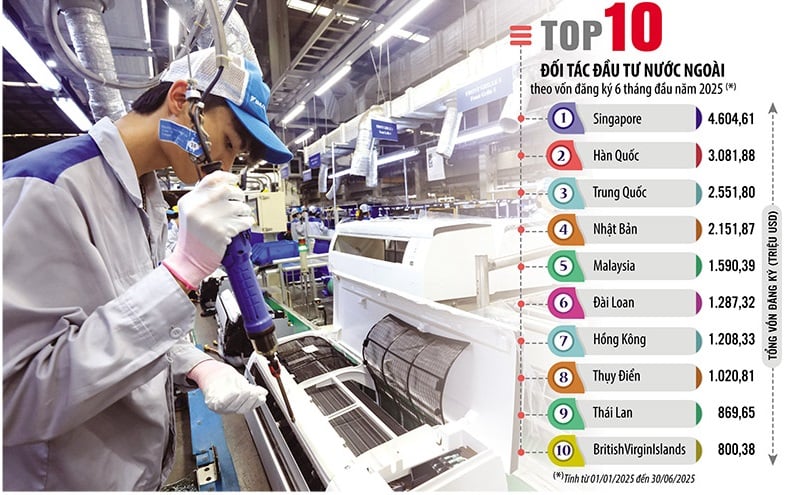 |
| No longer competing mainly on cost, Vietnam's core asset, according to many foreign investors, is its reputation in attracting more investment capital from partners around the world . Photo: Duc Thanh. Graphics: Dan Nguyen |
Repositioning investment advantages
For decades, low labor costs and an abundant labor force have been two key competitive advantages that helped Vietnam attract investment flows. Today, a more sustainable and convincing factor is gradually replacing it, which is “institutional prestige”. This fundamental shift is no longer just a theory, but in reality there is clear evidence to show it.
According to data from the Foreign Investment Agency ( Ministry of Finance ), in the first 6 months of 2025, foreign direct investment (FDI) inflows into Vietnam increased sharply by 32.6% over the same period, reaching 21.52 billion USD. This figure shows that Vietnam is affirming its role as an important investment destination in the region, in the context that countries such as Thailand also recorded an increase of 34% in the first 5 months of the year.
However, what is remarkable is not only the numbers, but also the profound changes in policy reform, infrastructure upgrades and a culture of administrative transparency that are reshaping Vietnam's entire investment ecosystem.
Vietnam’s investment environment has long been known for its dynamism and potential. Now, Vietnam is proactively moving towards predictability, transparency and trust-building. The shift from informal, ad hoc arrangements to a clear rules-based system is changing the way investors view and interact with the Vietnamese market.
This is not only a condition to attract more capital, but also the key to attracting strategic investors with a long-term vision - those who value certainty and a transparent operating environment. Vietnam is gradually transforming itself from a "low-cost factory" into a destination for quality capital flows, with high added value and sustainability.
Vietnam is vigorously promoting administrative reform, reflecting two parallel forces: domestic demands for improved governance efficiency and international expectations in an increasingly complex global investment landscape, especially following developments related to the Base Erosion and Profit Shifting (BEPS 2.0) policy.
The government has taken drastic actions. According to the Ministry of Home Affairs , in 2025, a major restructuring of central administrative agencies was carried out, thereby cutting about 20% of the number of ministries and ministerial-level agencies. Notably, 5 ministries, 4 specialized management agencies and 5 national press agencies were merged.
These efforts are not mere formalities, but represent a fundamental redefinition of the role of the State – from a traditionally cautious “gatekeeper” to a flexible, transparent and responsive “facilitator”. This is an important turning point, marking the transition from an arbitrary and informal operating system to a clearly structured and predictable mechanism. This is the foundation for building sustainable institutional trust in the long term.
 |
| Vietnam is gradually transforming itself from a “low-cost factory” into a destination for quality, high-value-added and sustainable capital flows. Photo: Duc Thanh |
Restructuring to strengthen trust
The journey to build a “smart government” in Vietnam is laid by the Strategy for E-Government Development to 2030, issued since 2021. The goal is to completely digitalize public services by the end of 2025, building a digital government and society by 2030.
Operational aspects are specified in regulations such as a unified set of standards and a deadline for administrative procedures issued in 2024. In particular, areas that used to be major “bottlenecks” for investors – licensing and land management – are undergoing detailed process redesign. While ambiguity and discretion were common in the past, Vietnam is now moving towards standardized, repeatable processes and integration of digital technology.
 Vietnam is putting transparency, consistent processes and an enforceable legal framework at the heart of its strategy to attract foreign investment.
Vietnam is putting transparency, consistent processes and an enforceable legal framework at the heart of its strategy to attract foreign investment. 
While implementation varies across localities and still faces many technical challenges, the overall approach is clear: substantial, continuous reform, linked to infrastructure modernization and adapted to local contexts. This transformation creates a soft infrastructure, called “trust infrastructure” – which helps strengthen the relationship between the State and investors.
Vietnam is placing transparency, consistent processes and an enforceable legal framework at the heart of its foreign investment attraction strategy. The legal environment has been adjusted to be more aligned with environmental, social and governance (ESG) priorities and digital transformation goals. The criteria for priority industries and strategic projects are now clearer, instead of being too broad as in previous ASEAN common agreements.
Two prominent advantages from this change, including increased compatibility with global tax standards, especially the OECD regulations on global minimum tax (Pillar Two), were legalized by Vietnam in 2023, thereby helping businesses reduce fiscal uncertainty and avoid the risk of international tax disputes and sending a strong message to strategic investors that Vietnam is serious about institutional reform and respects the rules of the game.
For many large investors, institutional and regulatory certainty is now as important as traditional factors such as labor, geographic location, or supply chain integration. This suggests that Vietnam no longer needs to be the easiest market, but can be the most trustworthy. The new competitive advantage is about raising transparency standards, not lowering barriers. And this model will attract businesses with a real long-term vision.
Investing successfully in Vietnam today depends on navigating regulatory complexities as well as identifying market potential. Accordingly, high-performing investors are increasingly adopting a “three-pillar strategy”.
The first is Digital Due Diligence, which uses digital tools and data analytics to thoroughly assess legal, market and operational risks. This includes physically examining the effectiveness of online licensing systems, procedural consistency and the quality of infrastructure at each local level, not just in form but in day-to-day operations.
Second is to work with reputable local legal consultants. Local experts understand regulatory interpretations, hidden practices, and informal expectations. They play a key role in translating regulations into effective operational strategies.
Third is a solid ESG framework – which is indispensable. ESG reporting will be mandatory for listed companies from 2021. Vietnam is also building a broader disclosure framework, although the full roadmap has not been announced. Proactive ESG monitoring helps businesses comply with both current standards and future requirements.
Investors who are willing to delve into the Vietnamese institutional reality and patiently learn the unique combination of policy and practice are likely to excel in the long term. Local understanding, acquired through the journey, is a valuable asset in handling complex issues and opening up new opportunities.
Speed up, but don't rush
Vietnam today bears the spirit of reform from the 1980s, pragmatic, progressive and non-ideological. Instead of being passive in the face of external pressure, Vietnam proactively builds a solid and trustworthy institutional foundation. The government proactively builds a more solid and trustworthy institutional foundation, rather than simply responding to external pressure.
While the above change may temporarily lengthen some administrative processes, or require new procedural adjustments, it also lays the foundation for something much more valuable – “sustainable institutional trust”.
This belief goes beyond simply mitigating short-term risks, to creating an environment where domestic and international investors can confidently make long-term commitments. Vietnam no longer competes primarily on cost. Vietnam’s core asset is reputation.
This strategic shift is a prerequisite for Vietnam to attract and retain high-quality capital flows, serving the goals of sustainable development, technological innovation and comprehensive growth. In the context of moving towards deeper integration with global standards systems, including expanding the ESG disclosure framework, Vietnam is sending a clear message: “Vietnam is not only open for business, but also committed to building a strong enough institution to realize the greatest economic aspirations”.
Source: https://baodautu.vn/thu-hut-du-tu-nuoc-ngoai-cua-viet-nam-trong-thoi-ky-moi-tu-loi-the-chi-phi-den-niem-tin-the-che-d335283.html



![[Photo] Prime Minister Pham Minh Chinh attends a conference to review one year of deploying forces to participate in protecting security and order at the grassroots level.](https://vphoto.vietnam.vn/thumb/1200x675/vietnam/resource/IMAGE/2025/11/12/1762957553775_dsc-2379-jpg.webp)


![[Photo] Highways passing through Dong Nai](https://vphoto.vietnam.vn/thumb/1200x675/vietnam/resource/IMAGE/2025/11/12/1762940149627_ndo_br_1-resize-5756-jpg.webp)

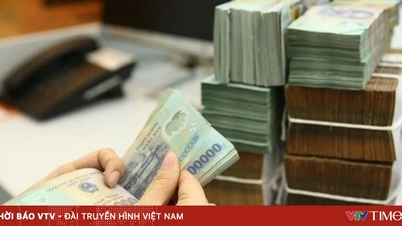

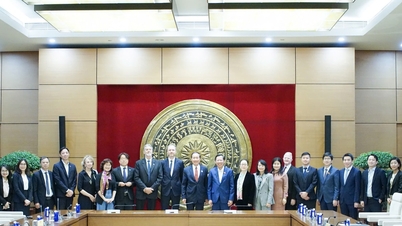

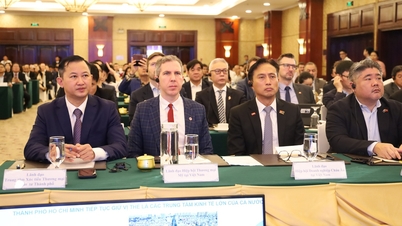

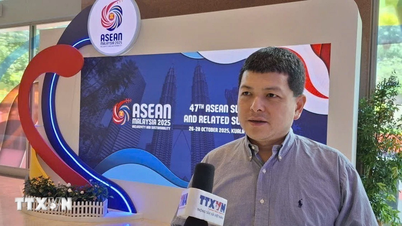

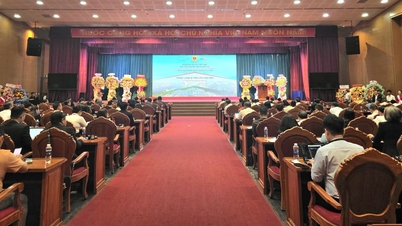

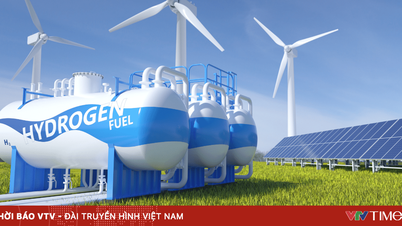






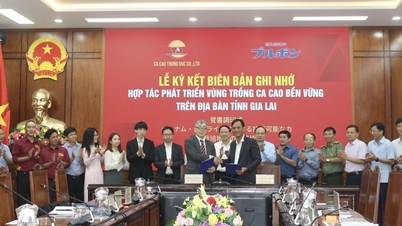










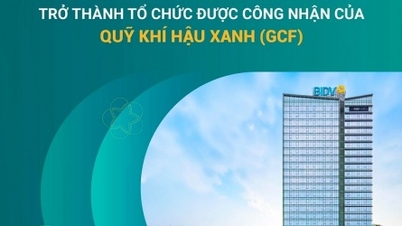





































































![Dong Nai OCOP transition: [Article 3] Linking tourism with OCOP product consumption](https://vphoto.vietnam.vn/thumb/402x226/vietnam/resource/IMAGE/2025/11/10/1762739199309_1324-2740-7_n-162543_981.jpeg)







Comment (0)